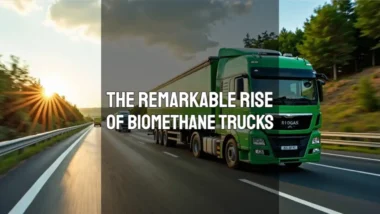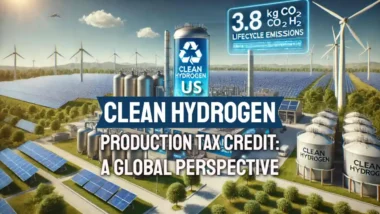In this article, you will read the story of power from the pastures and Landia's Chopper Pumps.
This is how, with a little help from Landia's Chopper Pumps, one North Wales Farm has mastered sustainable biogas production.
PRESS RELEASE (Landia) January 2025
The Hills Are Alive with the Sound-Thinking of Sustainability
As the saying goes: ‘Don’t judge a book by its cover’.
A partly submerged tank containing a Landia chopper pump and a mixer at Hendwr Farm’s biogas plant probably won’t win any industry awards in the ‘aesthetically pleasing’ category. But who cares? Least of all, Phil Hughes runs it.
Hendwr Farm spans almost 1,000 acres of lush green grazing fields in North Wales. It's a traditional hill farm that produces lamb and beef?
Yes, but it goes beyond that.
It is also a highly innovative visionary business that leads the way in diversification by taking a truly circular view of its future.
The farm (about 25 miles west of Wrexham) was established in 1902, when Phil’s great-grandfather, Cadwalader Jones Hughes, purchased it.
‘Diversification’ is of course a big current buzzword, and good job too, but John Hughes (Phil’s father), saw the benefits of it back in the late 1960s when he began offering camping at the farm, which then evolved into the thriving Hendwr Caravan Holiday Park.
Income from the serenely set medium-sized static caravan holiday park was and continues to be a success, but its growth meant plenty of electricity consumption. So, as the next Hughes generation brought its influence to bear, Phil (in 2011) went ahead with the introduction of ground-mounted solar panels.
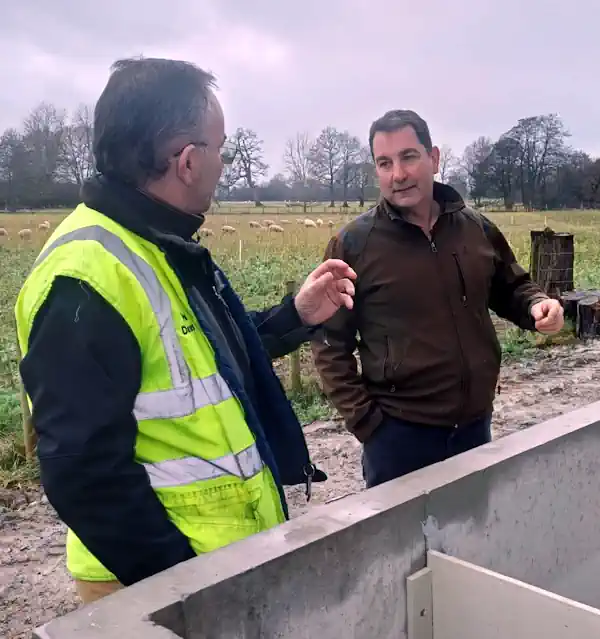
“We wanted to limit external inputs into the farm,” he said, “and when we saw the benefits of this first venture into renewable energy, we started looking at how else we could expand it.”
Producing only a modest amount of manure from 120 Angus calves, a plan emerged to combine this with waste, corn and chaff to feed a biogas plant. A plant that would not only produce energy, but fertiliser too. The farm didn’t really want to have to buy any more of it, especially given the rising cost of it. The key ingredient though would be to use chicken litter, which has proved to be a very fast and efficient feedstock.
‘Strong financial case for making this source of renewable energy work’
“I would say that when we started building our biogas plant in 2015, we were gloriously ignorant,”
added Phil Hughes.
“It was a thousand times harder than we thought it would be! But when you look at the value of farm produce compared to the value of anaerobic digestion (AD), there’s a strong financial case for it.
A compelling case for making this source of renewable energy work and work well.
Food is so undervalued. We’re incentivized as farmers to produce food as cheaply as possible, rather than look at the whole food cost and the effect on land and our wider society.”
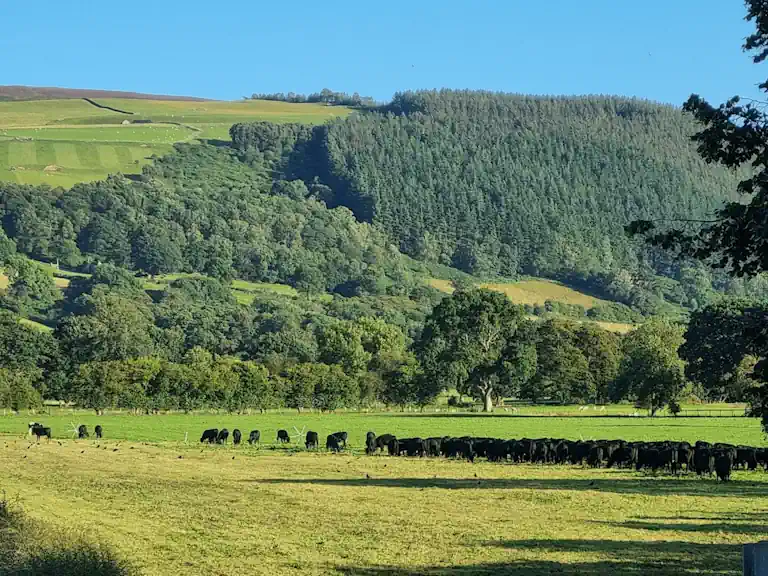
“We have almost 100 control signals on our biogas process, so if something isn’t right and an alarm goes off (typically in the middle of the night!) you have to deal with it straight away if you want to keep the plant up at its target performance levels, which for us, is a minimum of 95%. We have a 200kW engine, and a digester that very much fits our farm size.
I’ll admit that we’re obsessive about maintenance, but we have to hit high numbers to be profitable, and you just can’t neglect the biological process. It’s not like a light that you switch straight on.
It takes time to come back to full production, so time is money.
To keep our system running at its optimum levels, we’re always absolutely on it. We take regular samples, and over the years have learned what good biology is, so that we know what to do and what not to do.”
For its 90m3 reception tank, Hendwr invested in a chopper pump and a mixer from Landia to blend the incoming feedstock into a very homogenous mix.
“The only problem we had,”
continued Phil,
“is that after six years of continuous use, we eventually killed the pump! It was cast iron and was basically being asked to do something that it wasn’t designed for. The low pH, running at 3.8, had over time, made everything corrode. We very much wanted to stay with Landia's Chopper Pumps but to upgrade to stainless steel meant a short wait.
So they kindly helped us out with a temporary replacement so that we could keep producing gas. The Landia's Chopper pump is very effective and reliable, continuously reducing particle sizes, ready for the liquid to go through into our milling and micronizing lines.”
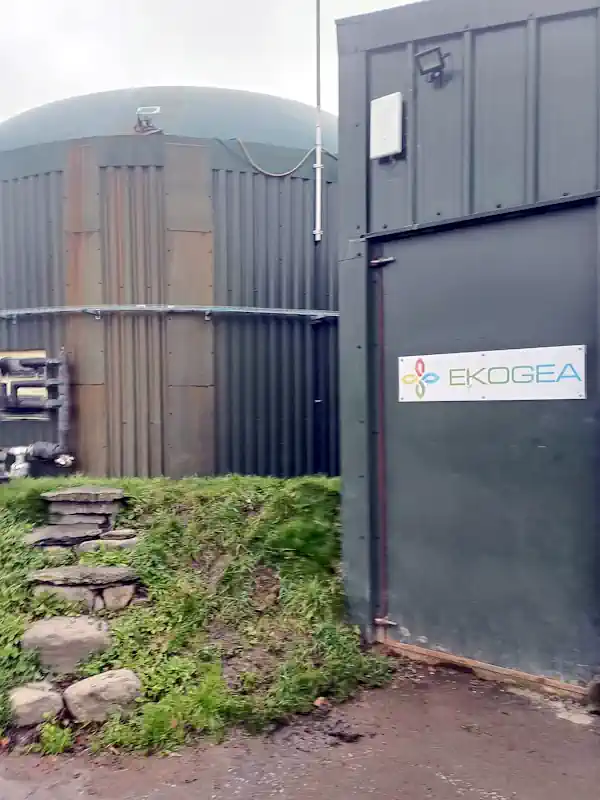
During lockdown when some of us put on far too much weight and drank far too much.
Hendwr far more wisely relieved the boredom by learning how to dewater digestate and slurry to get not only a dry, stackable solid but a polished water. A water quality that’s dischargeable into water courses.
This has resulted in the development of Ekogea, whose BioComplex product maximises biogas outputs and improves commercial viability. It also reduces waste digestate by up to 80% by volume.
It treats wastewater to Environment Agency-permitted discharge standards.
The product range helps with sustainable and profitable slurry management, provides natural fertiliser for crops and soil regeneration, and improves the health and profitability of livestock.
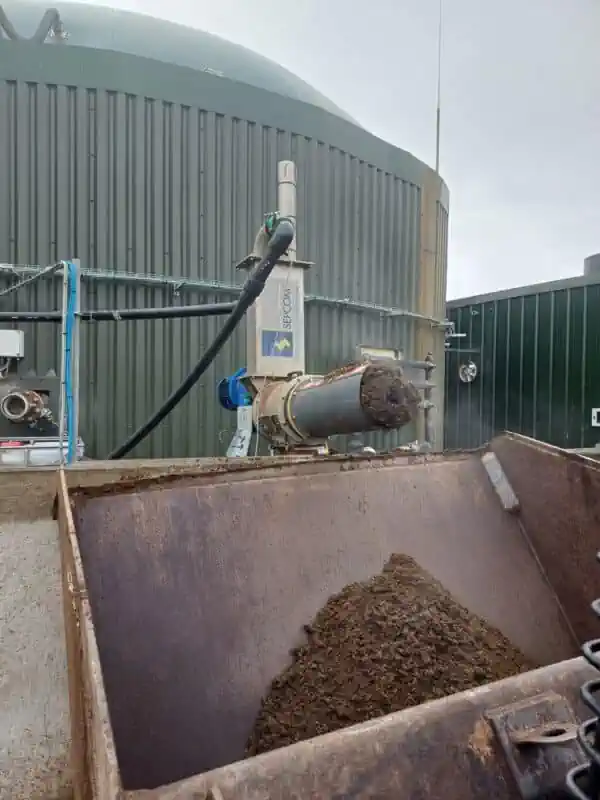
Phil Hughes continued:
“We’ve found a way of concentrating solids so that we can now dewater very efficiently. As hill farmers, it allows us to take that digestate as valuable fertilizer safely up onto the banks.
Whereas slurry tankers would be dangerous with all that weight sloshing around.
It’s a big advantage because we can deliver nutrients much further through the farm, which has increased our productivity. When spreading onto our land, it’s going into the plants, instead of going up into the air. That is why we’re growing so much more grass on the farm because the nitrogen isn’t being lost to the atmosphere.
“We’re actually reducing the volumes of liquids and slurries we’re dealing with by a factor of almost 10, reusing the water to wet the dry chicken litter at the front end of our system for a much cheaper, more efficient process.
Covering our lagoon (5m deep), was one of the best things I ever did. We have no shortage of rain in North Wales! Dewatering offers numerous options because it is so much easier to transport.
It is a very exciting piece of technology, which in addition to farming, can be used at factory sites, even if they already have a DAF treatment process. We can collapse the COD, BOD and nitrogen levels that we get charged for by the water companies.”
‘Good Mixing Remains Crucial’ – Landia's Chopper Pumps
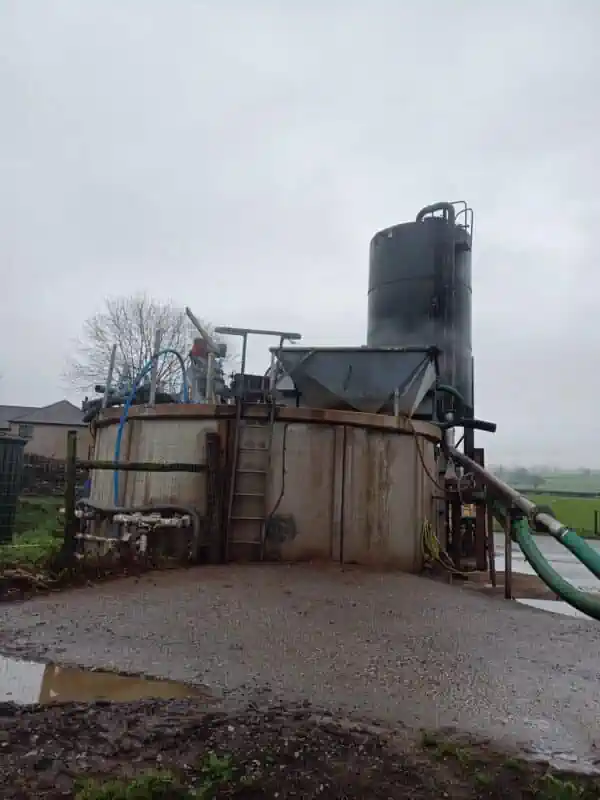
He continued:
“At the heart of our biogas process, good mixing and pumping for that all-important homogenization remains crucial using Landia's Chopper Pumps.
When the Landia team turn up to carry out maintenance, they are armed with good client data. We could be made to feel that we’re just a small customer out of thousands. But they know our names, know exactly what they are doing and provide very attentive, enthusiastic service. They’re good lads.
Hitting our performance target means having the right machines, the right service, and the right after-sales, which we’ve always had from Landia.”



